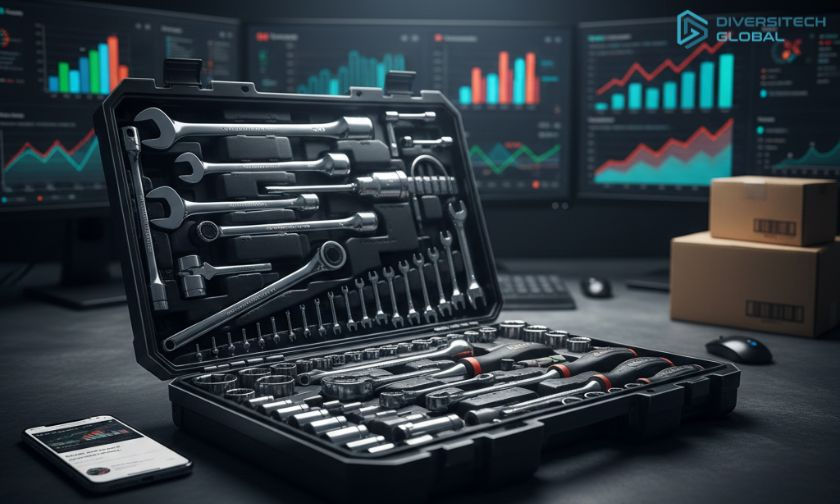The Next Generation of Innovative Tools
- Diversitech Global

- Feb 8, 2024
- 5 min read
Updated: Feb 20, 2024

Welcome to our comprehensive guide to the next generation of innovative tools. As a leading DIY tools company, Diversitech Manufacturing is committed to staying at the forefront of technological advancements in the industry. In this article, we will explore the cutting-edge innovations that are revolutionizing the world of DIY tools and hardware.
From smart tools and connected devices to advancements in materials, design, and manufacturing processes, each section will provide valuable insights into the latest trends and breakthroughs. Whether you're a professional contractor or a DIY enthusiast, this guide will keep you informed about the exciting developments in the tools and hardware market.
Table of Contents:
Smart Tools and Connected Devices
Smart tools and connected devices have emerged as a game-changer in the tools and hardware industry. These innovative tools leverage technology to enhance functionality, improve efficiency, and provide valuable data insights. Consider the following examples:
Smart Power Tools: Power tools equipped with sensors and connectivity features enable users to monitor performance, track usage, and receive real-time notifications about maintenance or potential issues.
Connected Measurement Tools: Measurement tools with Bluetooth or Wi-Fi capabilities can seamlessly transmit data to smartphones or tablets, allowing for easier data analysis and documentation.
Smart Home Integration: Tools designed for smart home integration enable users to control and monitor their tools remotely through voice commands or mobile applications.
By incorporating smart tools and connected devices into their arsenal, professionals and DIY enthusiasts can streamline tasks, improve productivity, and make informed decisions based on accurate data.
Advanced Materials and Design
Advancements in materials and design have significantly improved the performance, durability, and ergonomics of DIY tools and hardware. Manufacturers are continuously exploring new materials and innovative designs to enhance user experience. Consider the following advancements:
Lightweight and High-Strength Materials: Tools made from lightweight yet robust materials, such as carbon fiber or titanium, reduce user fatigue without compromising durability.
Ergonomic Design: Tools with ergonomic designs, featuring comfortable grips and optimized weight distribution, minimize strain and enhance user comfort during prolonged use.
Innovative Blade and Bit Technology: Advancements in blade and bit technology, such as carbide-tipped blades and diamond-coated bits, improve cutting precision, durability, and longevity.
By embracing these advancements, users can work more efficiently, reduce the risk of injuries, and achieve superior results in their projects.
Battery Technology and Cordless Tools
Battery technology has made significant strides in recent years, revolutionizing the cordless tool market. The latest advancements in battery technology offer increased power, longer runtimes, and faster charging capabilities. Consider the following developments:
Lithium-Ion Batteries: Lithium-ion batteries have become the industry standard, offering higher energy density, lighter weight, and longer cycle life compared to traditional battery technologies.
Fast-Charging Solutions: Rapid charging technologies, such as quick-charge or fast-charge systems, enable users to recharge batteries in a fraction of the time, minimizing downtime.
Battery Compatibility: Many manufacturers are now designing tools that are compatible with a range of batteries, allowing users to interchange their batteries across multiple tools.
Cordless tools powered by advanced battery technology provide greater mobility, flexibility, and convenience, making them an essential choice for professionals and DIYers alike.
Robotics and Automation
The integration of robotics and automation in the tools and hardware industry has transformed the way tasks are performed and optimized efficiency. From heavy-duty industrial applications to small-scale DIY projects, robotics and automation offer numerous benefits. Consider the following examples:
Robotic Arms: Automated robotic arms can perform repetitive tasks with precision and consistency, reducing the need for manual labor and improving overall productivity.
Automated Assembly Systems: Automated assembly systems streamline the production process, enabling faster and more accurate assembly of tools and hardware components.
Robotic Lawn Mowers: Robotic lawn mowers autonomously maintain lawns, navigating obstacles and cutting grass to desired lengths, freeing up time for users to focus on other tasks.
By harnessing the power of robotics and automation, professionals and DIYers can save time, reduce labor costs, and achieve higher levels of accuracy and efficiency in their projects.
Related Article: Cutting-Edge Advances in Tool Technology
Want to incorporate sustainability into your craft & art tool kits & double your sales? Get in touch
Augmented Reality (AR) and Virtual Reality
AR and VR technologies are finding their way into the tools and hardware industry, offering immersive and interactive experiences that enhance training, design, and visualization. Consider the following applications:
Training and Education: AR and VR can simulate real-world scenarios, allowing users to receive virtual training and practice using tools and equipment in a safe and controlled environment.
Design and Visualization: AR and VR technologies enable users to visualize and interact with virtual models of their projects, making it easier to plan and make informed decisions before starting the actual construction or assembly.
Remote Assistance: Using AR, experts can provide remote assistance by overlaying instructions and annotations onto the user's real-time view, guiding them through complex tasks or troubleshooting.
By incorporating AR and VR technologies, professionals and DIYers can enhance their skills, improve project planning, and receive expert guidance, ultimately leading to better outcomes.
Sustainable Manufacturing and Materials
As sustainability becomes an increasingly important aspect of the tools and hardware industry, manufacturers are adopting eco-friendly practices and materials. Consider the following sustainable manufacturing and materials:
Recycled Materials: Tools made from recycled materials, such as recycled plastics or reclaimed metals, contribute to reducing waste and minimizing the environmental impact of manufacturing.
Energy-Efficient Manufacturing Processes: Manufacturers are implementing energy-efficient processes, such as using renewable energy sources or optimizing production line layouts, to minimize energy consumption and carbon emissions.
Extended Product Lifecycles: Designing tools for durability, repairability, and upgradability ensures longer product lifecycles, reducing the need for frequent replacements and resulting in less waste.
By embracing sustainable manufacturing and materials, manufacturers and consumers can contribute to a greener future while still enjoying high-quality and reliable tools.
Collaboration with DIY Communities and User Feedback
Manufacturers are increasingly recognizing the value of collaborating with DIY communities and incorporating user feedback into product development processes. Consider the following practices:
User Communities and Forums: Manufacturers engage with DIY communities through online platforms and forums, fostering discussions, sharing insights, and gathering feedback on existing products and potential improvements.
Beta Testing Programs: By involving users in beta testing programs, manufacturers can receive real-world feedback, identify potential issues, and make necessary adjustments before launching new products.
Co-Creation and Customization: Some manufacturers offer customization options or involve users in the design process to create tools tailored to specific needs and preferences.
By collaborating with DIY communities and actively listening to user feedback, manufacturers can develop products that meet the evolving demands and expectations of their target audience.
Embrace the Future of Tools and Hardware
As we have explored in this comprehensive guide, the next generation of innovative tools is transforming the DIY tools and hardware industry. From smart tools and connected devices to advanced materials, robotics, IoT integration, and sustainable manufacturing, these advancements are revolutionizing the way professionals and DIY enthusiasts work. By embracing these innovations, we can increase efficiency, enhance safety, and achieve superior results in our projects. As Diversitech Manufacturing continues to lead the way in the industry, we are excited to bring you the latest tools and hardware that embody these cutting-edge technologies. Embrace the future of tools and hardware and unlock new possibilities in your DIY journey!
Related Article: Innovative Tool Solutions
Want to incorporate sustainability into your craft & art tool kits & double your sales? Get in touch




Wow, this reminds me of when I first started getting into DIY kits and realized how much the right tools change the game. The way you explained smart tools and AR for projects actually makes me want to dive into more stuff at home. I know that same feeling from using professional Nursing Assignment Help services once you get the right support, everything just flows smoother. Love how you guys are always ahead with innovation.